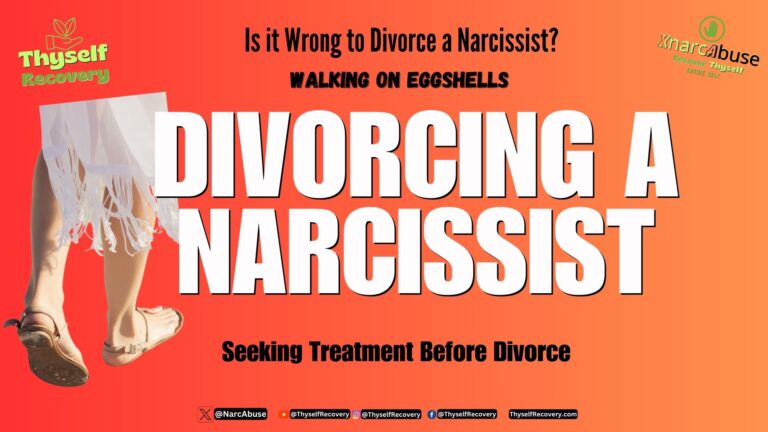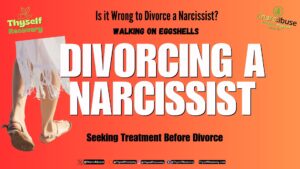Should a Narcissist Marry?
A narcissist’s disordered personality wreaks havoc in intimate relationships. This raises questions around the ethics of narcissists pursuing marriage and whether they can truly fulfill spousal duties. While some narcissistic traits exist on a spectrum in the general population, for those meeting the clinical threshold, the capacity to maintain healthy marriage appears severely compromised. However, given narcissism’s foundations in childhood wounds, one must have compassion while also preventing further harm. This nuanced dilemma requires analyzing key considerations.
The Narcissist’s False Self While Wooing
When courting potential partners, narcissists often strategically present their most glittering, attractive facade. Charm offensives are launched through:
- Love bombing via constant communication, lavish gifts, and boundless compliments
- Mirroring the target’s interests, values, and dreams to create false twinship
- Flooding them with promises of an idealized future together
- Denigrating the target’s existing relationships to monopolize affection
This masks the narcissist’s true deficient self underneath the flashy presentation.
Evaluating Their Capacity for True Intimacy
True intimacy requires:
- Expressing emotional and sexual vulnerabilities
- Compromise and considering a partner’s needs/wants equally
- Mutual understanding of each other’s inner worlds
- The ability to self-reflect and admit wrongdoing
These traits contradict the narcissist’s profound sense of entitlement, lack of empathy, and fragility when not dominant in the relationship. Their disorder impedes essential intimacy.
The Disastrous Mix: Narcissist and Empath
Initially, the giving, patient empath is the narcissist’s ideal target. But this toxicity is guaranteed:
- Love bombing switches to chronic criticism and neglect of the partner.
- The empath’s needs are dismissed and only the narcissist’s matter.
- Narcissistic rage and frightening extremes of behavior emerge.
- The partner is isolated from outside support and tries desperately to people-please.
- The empath develops trauma bonds and loses their sense of self.
This dynamic amounts to psychological imprisonment and abuse.
The Pain Inflicted on Spouses
Spouses of narcissists suffer profoundly:
- Spiraling self-doubt and plummeting self-esteem
- Depression, anxiety, PTSD symptoms from living with a volatile egomaniac
- Chronic cognitive dissonance trying to reconcile their pain with the person they love
- Loss of identity, passions, goals, and close relationships
- Exhaustion from managing all domestic responsibilities, walking on eggshells
The abuse wreaks psychological and even physical havoc.
Impact on Children
Growing up with a narcissistic parent leads to:
- Role modeling of entitlement, aggression, and manipulation
- Parentification – children adopt caretaker roles
- Emotional neglect or abuse
- Losing trust and security in the family system
This can imprint narcissistic traits intergenerationally.
The Narcissistic Spouse’s Daily Reality
Life with a narcissist means:
- Living under tyranny and siege conditions due to their hair-trigger rages
- Chronically hustling to meet unreasonable demands, standards, deadlines
- Being demeaned and discarded whenever their fragile ego feels threatened
- Managing all domestic responsibilities solo with no appreciation
- Having no safe space – privacy is nonexistent
This day-to-day environment destroys spousal wellbeing.

Why Partners Remain Trapped
Despite the nightmare of narcissistic relating, many spouses stay married. Reasons include:
- Trauma bonding – intermittent abuse and kindness keep partners addictively chasing validation.
- Financial control – the narcissist may prevent independence.
- Low self-esteem – victims lose sense of worth and options.
- Normalizing dysfunction – cognitive dissonance leads to acceptance.
- Internalizing blame – victims self-attack rather than holding partners accountable.
- Fear – the narcissist weaponizes threats, retaliation, and frightening rages if opposed.
This mix of psychological and logistical factors keeps victims imprisoned.
Possibilities for Change
Some experts argue narcissism exists on a continuum and productive shifts are possible. Successful treatment requires:
- Motivation for change – the narcissist admits their behaviors are harmful.
- Committing to long-term therapy with an experienced narcissism specialist.
- Developing insight into the childhood wounds driving their disorder.
- Learning to self-reflect with brutal honesty.
- Consistently exhibiting empathy, compromise, and consideration for others’ needs.
Without motivation and follow-through, substantial change is unlikely.
Weighing Reform vs Refraining from Marriage
If self-awareness remains elusive and the narcissist resists therapeutic work, pursuing marriage appears deeply unethical. However, if breakthroughs are achieved, marriage may become feasible over a long evidence-based period of successful behavioral change. Minimal ethical criteria would include:
- Accepting full responsibility for past wrongdoing without excuses or blaming the victim.
- Listening to feedback patiently even if difficult truths are shared.
- Controlling egocentric impulses and considering what the partner wants.
- Managing destructive behaviors related to rage, envy, insecurity.
- Practicing empathy and true reciprocity.
With years of earnest reconditioning, ethical marrying may become possible. But integrity would demand full transparency about their condition when dating.
How Ethical Narcissists Could Date
Should narcissists commit to evolve, experts suggest:
- Seeking long-term therapy and joining support groups.
- Avoiding romance until mastering self-awareness and interpersonal skills.
- When dating, immediately disclosing their narcissistic history and growth process.
- Moving extremely slowly with romantic prospects to demonstrate change.
- Continuing to take inventory of themselves when in relationships.
- Listening to feedback carefully even when their reflex is defensiveness.
- Willingly answering any questions prospects have regarding their capacity for healthy relating.
With extreme diligence, those overcoming engrained narcissistic traits could potentially date with everyone’s wellbeing considered. But proceeding ethically would require patience, courage, and a commitment to transparency.
In closing, the question of whether narcissists should marry has no universal answer. But analyzing narcissistic behaviors with nuance rather than condemnation allows us to discern ethical complexities. We must balance realism about typical limitations with compassion for the narcissist’s humanity and potential. Such wisdom can hopefully lessen suffering for all.


